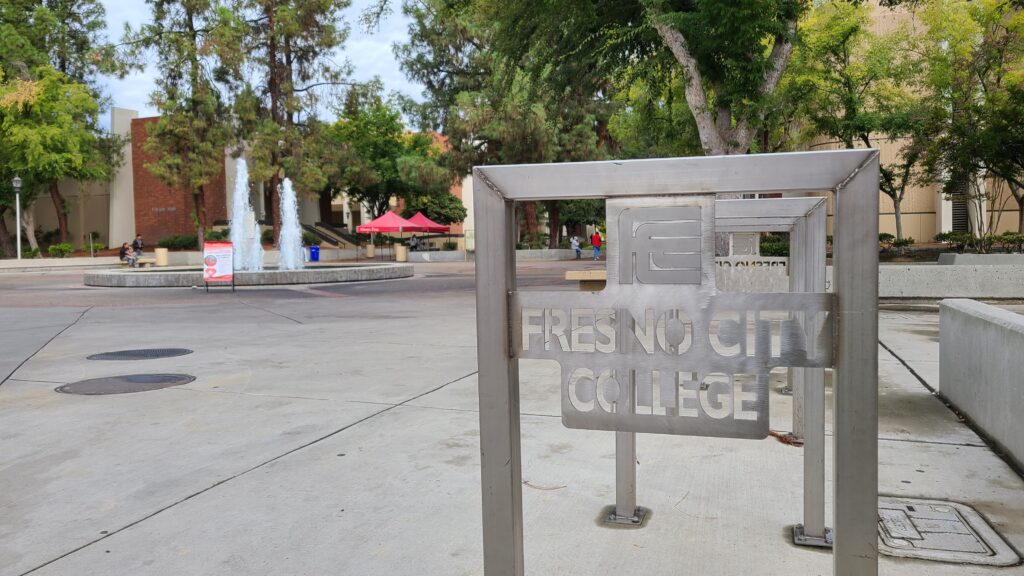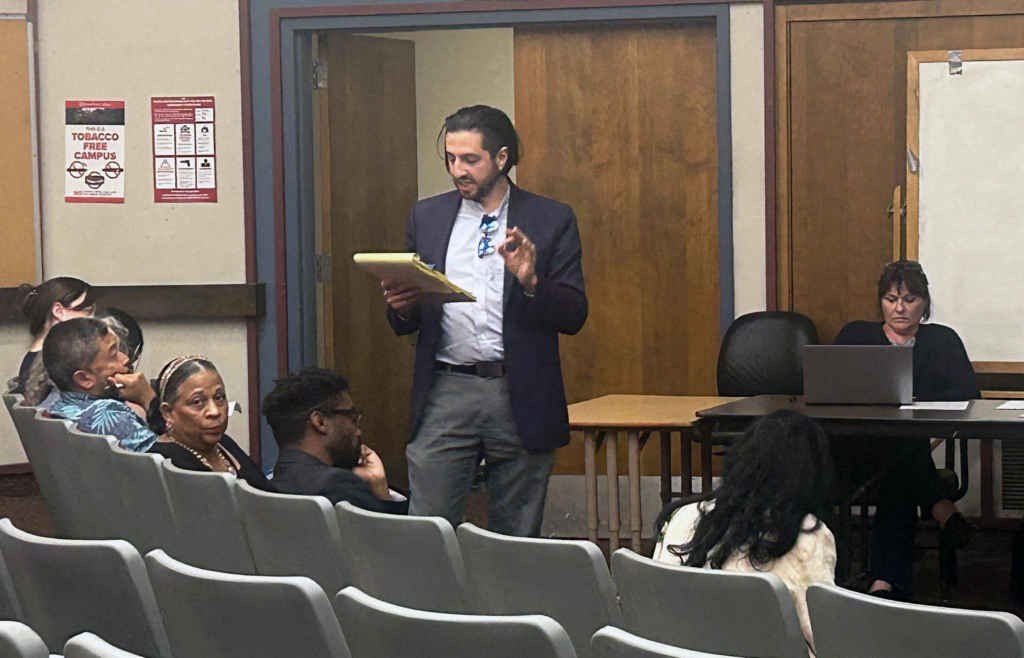
Tenured communication instructor Tom Boroujeni, who is on involuntary administrative leave, spoke at the May 8, 2024, Fresno City College Academic Senate meeting, in which the senate voted on removing him as president.
Lasherica Thornton/ EdSource
This story has been updated with the exact number of yes, no and abstention votes counted. The membership secretary for the academic senate provided the numbers to EdSource Thursday evening. A statement about the votes has also been clarified.
The Fresno City College Academic Senate on Wednesday failed to take action on tenured communication instructor Tom Boroujeni, who has been on involuntary administrative leave since Nov. 30 but has refused to step down as president.
During the final meeting of the semester, not enough members of the senate voted to remove Boroujeni as president, and not enough voted to table the removal until next semester in August. Many senators abstained from the votes. Even though more instructors voted to remove him as president than to table the matter, without a majority, the academic senate will end the semester and likely start a new school year under the leadership of the president-elect and acting president, Jackie Williams.
It leaves the academic senate in limbo, said theater design instructor Christina McCollam-Martinez, who had filed two petitions to remove Boroujeni as president.
“We can’t move forward; we’re stuck,” McCollam-Martinez said during the meeting. “When you don’t get to choose anymore, you get stuck; you don’t have an option.”
Members of the senate were divided over whether a removal impacts due process, speaks to one’s belief about the allegations, puts the senate back on track or sends a message about faculty rights — a contention made by Boroujeni.
“I’m not doing that (stepping down) because I’m an advocate for faculty,” Boroujeni told his colleagues during the meeting, at which he had permission to speak, not as a member of the academic senate but as a member of the public. He did not speak as a community member, though, but twice during discussions by the senators.
Boroujeni was put on leave following a Nov. 29 EdSource report that revealed that a Fresno State investigation determined that Boroujeni committed an “act of sexual violence” against a professor and colleague who also works at Fresno City College. Some professors canceled classes. Boroujeni denied that any sexual violence took place. He also claimed that the Fresno City College suspension stemmed from disagreements with State Center Community College District over academic policies.
With a recent change in Fresno City College senate bylaws, the executive board recommended the removal of Boroujeni because his administrative-leave status caused Williams to become acting president with no one serving as president-elect, a key post on the executive board.
”Voting to remove the current president is not about whether they did or did not do what they are on leave for,” said Alana Jeydel, a history and political science professor. “It’s simply about the fact that our senate can’t go for a semester or possibly longer with someone who hasn’t been here. … We need the person who’s been here for the past semester to keep working for us.”
No longer “silent” about what to do when an officer is on leave, the bylaws now state that a leave of absence can trigger a process to fill the vacancy. The bylaws of many academic senates across the state reportedly have language requiring a senator to relinquish the seat for any leave.
A removal would have made Williams president starting next semester and led to elections for a president-elect.
Though no decision was made about Boroujeni’s role as president, the failed attempt to remove him is indicative of the division at the college. Eleven senators at the meeting abstained from the removal vote.
Waiting on outcome of investigation?
When the community college district put Boroujeni on paid leave in late November, the district also launched an investigation.
Boroujeni told his colleagues that his administrative leave, which district and college administration hasn’t publicly disclosed details about, is not related to the Fresno State case but to three Fresno City College complaints filed months ahead of the district’s decision to place him on leave, following EdSource’s report on the Fresno State sexual violence investigation and subsequent decision by his colleagues to cancel classes.
Boroujeni said that the investigation was set to end this week but was extended until May 31. He has characterized the complaints as allegations of “gender discrimination.”
“The road map that you need is: Wait for the investigation to end,” Boroujeni told his colleagues before their vote. “If there is anything in the investigation, use that to remove me because that will give you the ammunition so you can preserve the power of the academic senate.”
Because the college has not yet concluded the investigation, some instructors said they preferred to wait on the outcome before voting on the removal. Nikki Visveshwara and Eileen Gonzalez, professors in the nursing department, said Boroujeni has the right to due process.
“I think we should’ve waited to find out what the judgment from the district was … so that we have full information when we’re making the vote,” said Michael Takeda, past academic senate president and member of the executive board, who did not support the recommendation for Boroujeni’s removal.
Expecting a judgment or specific details to be publicized or shared by the district may not be realistic. Over the last six months, district spokesperson Jill Wagner has not disclosed details of the investigation, stating that it is a personnel matter.
Even when it is resolved, “we don’t necessarily talk about it because it’s still a human resources matter,” Wagner told EdSource in mid-February. Wagner did not immediately respond to requests for additional information or comment on Wednesday. But, when the investigation concludes, the findings will be subject to California’s Public Records Act which requires the release of personnel investigations when allegations are confirmed.
“Unacceptable to have this cloud hanging over us”
Boroujeni has taught at Fresno City College since 2015, the same year he began his academic career at Fresno State while still a graduate student. The victim of the alleged sexual misconduct is also a professor and Boroujeni’s colleague at the community college. The State Center Community College District, parent agency to Fresno City College, learned of the sexual misconduct investigation when the alleged victim requested a no-contact order, which was granted in the spring semester of 2022.
Fresno State opened the investigation in 2020 based on the federal anti-discrimination law known as Title IX, records show. The investigation determined that Boroujeni committed sexual violence in 2015. At the time of the incident, Boroujeni was a part-time instructor at Fresno City College while finishing a master’s degree at Fresno State, records show.
Boroujeni was never disciplined in the sexual violence matter because he was a graduate student when the alleged violence occurred. Boroujeni resigned from Fresno State in 2022 after officials said the act-of-sexual-violence report would be placed in his personnel file.
Despite Boroujeni’s assertions linking the senate’s proposed action to the investigation, most of the professors who spoke in favor of the removal said their position had nothing to do with the allegations but the senate’s ability to perform its duties.
Business instructor Robert Schmalle, who didn’t take a position on the allegations against Boroujeni, reminded his colleagues that the academic senate is a political body making political decisions.
Both he and anthropology professor German Loffler said keeping Boroujeni as president reflects poorly on the college and senate.
“It’s just simply unacceptable to have this cloud hanging over us,” Schmalle said.
And a removal is not about the administrative leave, Jeydel, the political science professor, reiterated.
“It’s simply to replace somebody who is on leave — for whatever reason it is,” she said. “I don’t see the vote as about passing judgment on what one person has or has not done.”
The academic senate president works with the college’s administration in setting academic policy and represents the senate and faculty at college, districtwide and public meetings.
Amended bylaws have been months in the making
With an April 24 change in bylaws, Wednesday’s meeting was the first time that the senate has been able to vote on action to handle Boroujeni’s inability to fulfill the duties of president during his leave.
The academic senate amended its bylaws last month, but the process has been months in the making, dating back to before Boroujeni was placed on leave.
But Boroujeni accused the academic senate of changing the bylaws due to his leave.
The bylaws, according to Williams, were addressed the entire semester with proposed changes being brought to the senate for feedback.
“It was not precipitated or initiated in response to President Boroujeni being placed on administrative leave,” she said. “There was already the plan for revise.”
She told EdSource in January that as the senate went line by line through the bylaws, members learned that the bylaws were silent on what to do when officers are on leave.
Language on quorum, absenteeism, proxy attendance, officers and officer responsibilities were tweaked alongside the addition of: “In special circumstances, e.g., the removal/resignation of multiple officers, or leaves of absences of an officer, the Executive Board shall determine the process for filling the vacancies.”
Before the bylaws were amended, the only way to remove Boroujeni was through a petition with at least 25% of senators signing to initiate a vote, during which 50% must be present, and 75% must vote for removal. The revision changed the voting requirement to two-thirds, or 66%.
Since December, there have been three petitions calling for Boroujeni’s removal as president.
Under the added process in the bylaws, removing Boroujeni, who is on leave, required a majority vote of members present. Of the 62 members present, 29 voted to remove him and 15 voted to table the removal. Thirty-two votes would have constituted the majority.
Boroujeni: Stepping down hurts faculty
Before McCollam-Martinez, the theater design instructor, started the second and third petitions to remove Boroujeni as president, she sought clarity from a past president of the academic senate for California Community Colleges about how most colleges handle a leave of absence.
She learned that most presidents step down because of the mere fact that he or she cannot fulfill the duties of the role.
“Normally, that’s what would happen,” she said.
Boroujeni said during the meeting that stepping down would have been the “easy thing” to do.
“Let me explain to you why I haven’t stepped down. Stepping down would send a very specific message to the administration — that you can put the president on leave and that the president will step down,” he said.
He spoke not once as a community member as he had permission to but twice during the senators’ discussions, which further fractured the already splintered community college community, said a college employee who attended the meeting but asked for anonymity.
The community college district counsel and Fresno City College president confirmed to EdSource that Boroujeni requested permission to speak as a community member, not as a senator.
“It reflects his character of manipulation and bullying,” the college employee said.




